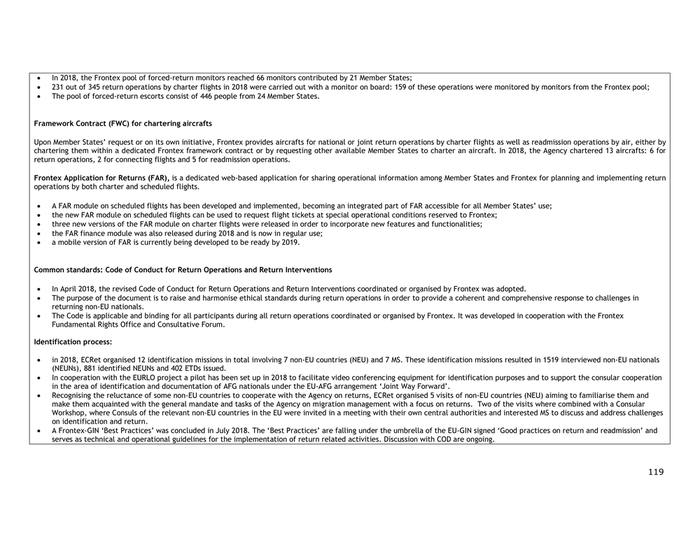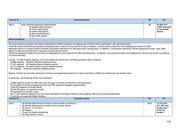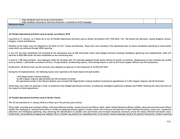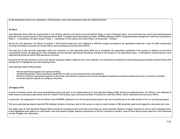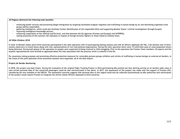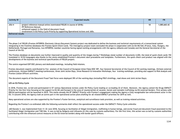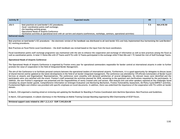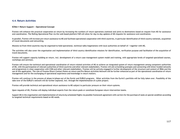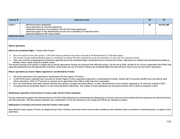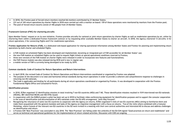Microsoft Word - CAAR_2018_FINAL_Adopted_Reg. No. 5865_13.06.19
Activity ID Expected Results HR FR JOU-2 Joint maritime operations implemented: 52 97,859,347 - JO Poseidon 2018 (Greece) (100% allocated - JO Themis 2018 (Italy) to sea border - JO Indalo 2018 (Spain) sector) - JO Minerva 2018 (Spain) - JO Hera 2018 (Spain) Delivered Results Five joint maritime activities have been implemented in 2018 resulting in the deployment of 8,241 officers delivering 1,241 operational days. Three MS hosted and 28 MS participated by deploying their resources in the maritime JOs. In addition, 16 third country observers were deployed by Frontex in 2018. Deployed experts of various profiles including interpreters performed 233,189 operational working-days. In addition, crewmembers delivered 154,045 operational human -days. Both figures include the host MS human resources co-financed by Frontex. Technical equipment (seaborne and airborne) deployed by Frontex delivered 64,993 patrolling hours. In addition, the terrestrial assets were deployed to enhance the border surveillance in Greece and Italy. In total, 117,966 irregular migrants were intercepted during the joint maritime operations 2018 as follows: - 55,900 migrants - JO Indalo (Western Mediterranean), - 37,335 migrants - JO Poseidon (Eastern Mediterranean) - 23,211 migrants - JO Triton/Themis (Central Mediterranean) - 772 migrants – JO Minerva (Western Mediterranean) Besides, Frontex has provided substantial technical and operational assistance in Search and Rescue (SAR) and combatting cross-border crime. In particular, the following results were reported: - 37,000 migrants rescued in SAR cases with any type of Frontex involvement in sea operations; - 273 incidents involving smuggling activities and 700 suspected smugglers apprehended; - 3,283,522 kilograms of drugs seized; - 28,336,595 pieces of cigarettes seized; - 10 suspected sea pollution cases; - Over 1,442 fisheries sighting forms have been submitted to European Fisheries Control Agency (EFCA) and national authorities; - 2 incidents on suspected illegal fisheries. Activity ID Expected results HR FR JOU-3 -JO Flexible Operational Activities Land on border surveillance; 33.5 13,341,072 -JO Flexible Operational Activities Land on border checks (91.18% land -JO Alexis I, II, III and IV border and -JO Pegasus 8.82% air - Project Air Border Monitoring border) -JO Vega Children I and II 110
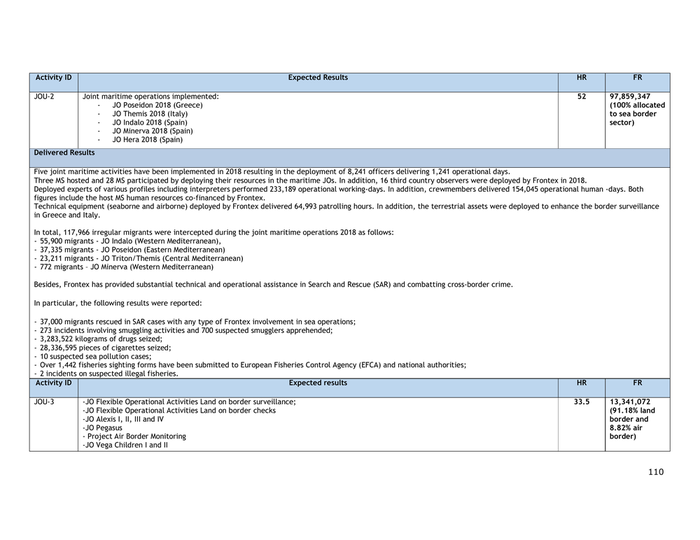
-Vega Handbook Land (focusing on land borders) -Vega Handbook (focusing on maritime dimension) translated to all EU languages Delivered results JO Flexible Operational Activities Land on border surveillance 2018 Launched on 31 January, as a follow-up to the JO Flexible Operational Activities Land on Border Surveillance 2017 (FOA BCU). Five MSs hosted the operation, namely Bulgaria, Greece, Hungary, Croatia and Romania. Members of the teams were not deployed to the BCUs of LCCs’ Croatia and Romania. These LCCs were included in the operational plan to ensure situational monitoring of these border areas which was achieved through JORA reporting. A new LCC has been established and activated at the operational area at GRC-ALB border where fully fledged activities including intelligence gathering were implemented, while LCC Moravita at ROU-SRB border has been established as new monitoring area. A total of 1,780 team members were deployed within the JO along with 312 internally deployed border police officers for border surveillance. Deployments of team members per profile were as follows: 1,368 border surveillance officers, 79 dog handlers, 62 debriefing experts, 30 screening experts as well as 94 Frontex Support Officers and 103 interpreters. Furthermore, 38 officers from non-EU countries were deployed as observers in the framework of JO FOA 2017 BCU. During the JO implementation, the following results were reported at the South-Eastern EU land borders: - 1,919 illegal border-crossing incidents, - 16,248 irregular migrants apprehended and 336 facilitators arrested. - the operational results in the Western Balkans area included 456 illegal border-crossing incidents involving the apprehension of 2,292 irregular migrants and 40 facilitators. Initial steps were taken for planning in order to implement fully-fledged operational activities, including the intelligence gathering in Albania and FYROM, following the entry into force of the respective Status Agreements. JO Flexible Operational Activities Land on Border Checks The JO was launched on 31 January 2018 as a follow up of the previous year activity. Thirty-eight seconded team members (STMs), with three different profiles, namely Second Line Officers (SLO), Stolen Vehicle Detection Officers (SVDO), Advanced-Level Document Officer (ALDO) were deployed at selected Focal Points in 10 MSs providing operational support in border checks with a focus on the detection of false/falsified documents, stolen cars, clandestine detections and intelligence gathering, thus advancing the identification of possible risks and threats and increased situational awareness across the mainly affected land border areas. Furthermore, the possibility to deploy and redeploy TMs in a flexible way allowed for responding faster to the border-related challenges faced at the specific focal points. Incident reporting 111
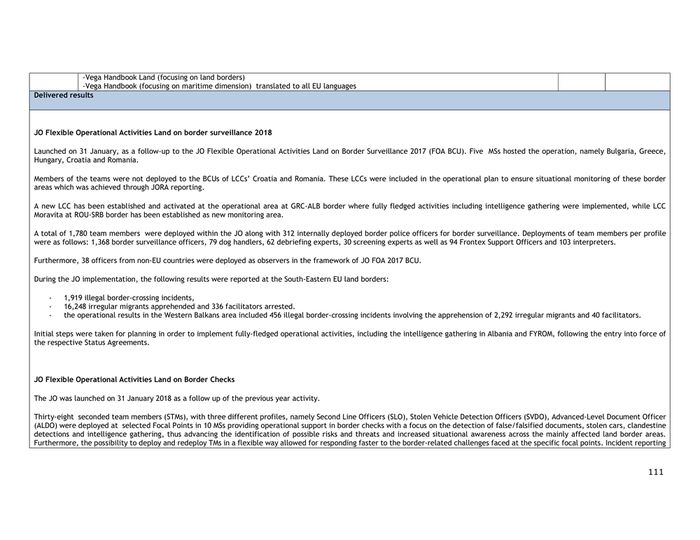
of this operational activity was integrated in JO focal points, hence the operational results are reflected therein. JO Alexis Joint Operation Alexis 2018 was implemented in four different phases at 37 airports of the EU Member States. In total 23 Member States, seven third countries and 37 participating airports took part in the implementation of Joint Operation Alexis 2018. To support Alexis operational activities, INTERPOL deployed 5 IBMTF (Integrated Border Management Task Force) coordinators; Phase 2 − 2 coordinators at Lisbon Airport, Phase 3 − coordinator at Faro Airport and within Phase 2 at Amsterdam – Schiphol. During the Joint Operation, 87 officers (including 11 third-country observers) were deployed at different airports according to the operational needs for a total of 2,690 working-days covering the profiles of Second-Line Airport Officer and/or Advanced-Level Document Officer. The main aim of the activities undertaken within the framework of Joint Operation Alexis 2018 was to strengthen the operational capabilities of EU airports to address the perceived vulnerabilities/needs. By applying the VEGA Handbook and the Standard Operational Procedures provided in the annexes of the operational plans, 11,878 specific countermeasures were implemented during the Alexis 2018 operational activities. During the JO the main threats as well as new aspects regarding irregular migration flows were reported. The information provided by the participating airports greatly assisted Frontex Risk Analysis Unit in highlighting new and emerging trends. Joint Operation Alexis 2018 provided: - tailored operational support and capacity building; - strengthening Member States operational capabilities in order to overcome perceived vulnerabilities; - effective & efficient operational response to perceived vulnerabilities meeting current threats (European Situational Awareness) enhancing security of external air borders; - increased response capacity to emergency situations. JO Pegasus 2018 A total of 6 Member States with seven participating airports took part in the implementation of Joint Operation Pegasus 2018. During the implementation, five officers were deployed at these airports according to operational need for a total of 530 working -days covering the profiles of Second-Line Interview Officer and/or Advanced-Level Document Officer. In particular, the deployment of the two officers from INTERPOL deployed at one of the participating airports was very successful due to the high number of hits on incoming passengers. The seven participating airports reported 230 validated incidents involving a total of 461 persons as well as a total number of 380 unlawfully used travel/supportive documents and visas. The added value of Joint Operation Pegasus 2018 consisted of increasing mutual awareness concerning new modus operandi related to irregular migration as well as some emerging trends. It also highlighted some aspects of cross-border crime and related irregular migratory phenomena at the EU’s external air borders, some of them being already observed in the framework of other Frontex Joint Operations. 112
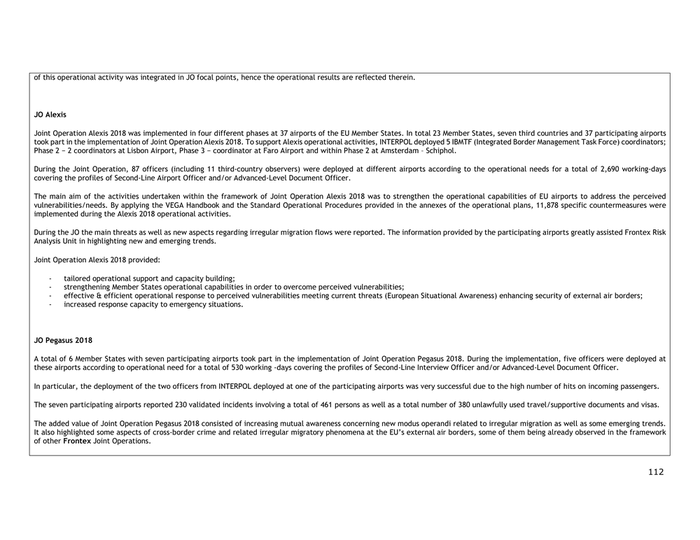
JO Pegasus delivered the following main benefits: - enhancing border security and preventing illegal immigration by targeting facilitated irregular migration and trafficking in human beings by air and identifying organised crime groups (OCGs) responsible; - gathering intelligence, which could also facilitate further identification of the responsible OCGs and supporting Member States’ criminal investigations through Europol; - improving intelligence/knowledge picture; - enhancing cooperation at the national and EU level, and that between the EU Agencies (Frontex and Europol) and INTERPOL; - raising awareness of the common risk indicators in respect of foreign terrorist fighters or those linked to militant Islam. JO VEGA Children 2018 In total 14 Member States and 6 third countries participated in the joint operation with 23 participating hosting airports and with 42 officers deployed (26 TMs, 2 EU advisers and 14 third- country observers) in mixed teams along with nine representatives of two international organisations. During the joint operation there were 19 confirmed cases of unaccompanied minors being detected. During both phases of the operation six people were suspected of being involved in child smuggling. Prior to the operation the Frontex Team members, IO experts and the airports representatives were briefed an appraised about the risks associated with the practice which is unlawful in the EU. For awareness raising purposes and promoting effective protection measures for vulnerable persons/groups (children and victims of trafficking in human beings) at external air borders, in the frame of this joint operation three awareness sessions were organised, all at the Oslo Airport. Project Air Border Monitoring In 2018, the project was kept frozen. During the evaluation of the original Flight Tracking Project in 2014 participating MSs pointed out that alerting activity at air borders adds value in case certain personal data of the concerned passengers could be also communicated in the alerts. In 2017, the assessment of the project was made with the support of Frontex LPU, considering the new mandate of the EBCGA. The assessment outcome suggests that personal data in this regard could only be collected autonomously by MSs authorities and continuation of the project would require Frontex to integrate the Airline Liaison Officers deployed to third countries. 113
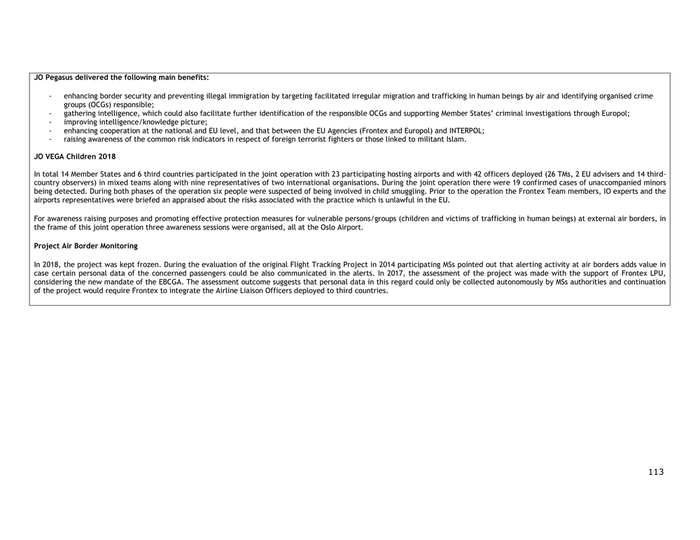
Activity ID Expected results HR FR JOU-4 -project reference manual online (nominated FIELDS in course of 2018); 10 1,085,665.42 -PP Reference Manual; -enhanced support in the field of document fraud; -involvement in EU Policy Cycle Priority by supporting Operational Actions and JADs. Delivered results The phase 2 of FIELDS (Frontex INTERPOL Electronic Library Document System) project was dedicated to define the business and technical requirements of a transactional system integrating in the frontline databases the Frontex Quick Check Cards. The interagency project team concluded the phase in cooperation with six EU MS/SAC (France, Italy, Hungary, the Netherlands, Portugal and Romania), two INTERPOL member countries having signed working arrangements with the agency (Albania and Canada) and the General Secretariat of the Council of the EU. The Frontex database on documents was further improved in quality and quantity of the images during 7 Workshops (total number of documents 4,204, the total of quick check cards 192 translated in 10 EU languages) also thanks to the newly established Frontex’s document alert procedures and templates. Furthermore, the quick check card product was aligned with the developments of the business and technical specifications of FIELDS project. The centre organised EXP DOC plenary and dedicated meetings, including field missions. Frontex document experts contributed to five sessions of the Council of European Union False-DOC WP, four General Secretariat of the Council of EU working meetings, thirteen external conferences, thirteen EMPACT meeting/conferences, three Joint Action Days, three Research & Innovation Workshops, four training workshops, providing also support to Risk Analysis and Frontex Liaison Officers activities. The document experts of the Document Fraud Task Force were deployed 39% of the working days (including FDU’s briefings, road shows and Joint Action Days). LES on EU Policy Cycle In 2018, Frontex led, co-led and participated in 57 various Operational Actions under EU Policy Cycle leading or co-leading 22 of them. Moreover, the Agency joined the Drugs EMPACT Priority for the first time focusing on the support to EU MS and Europol in the area of counteraction of cocaine, heroin and cannabis trafficking via EU external borders. First actions with EBCGA participation will be launched in 2019. This marks already the 8th EMPACT Priority with Frontex’s engagement making the Agency a fully recognisable law enforcement actor in the EU. In autumn 2018, the Agency took an active part in the operational action plans drafting for all related EMPACT priorities for 2019 as well. Many operational actions are also supported by the Frontex’s Fusion Services, analytical and surveillance tools provision, as well as training-related activities. Regarding the Frontex’s co-ordinated JADs the following summaries shall reflect the operational success under the EMPACT/ Policy Cycle umbrella: JAD Danube 3, was implemented from 11−22 June 2018, focusing on facilitation of illegal immigration, trafficking in human beings, and excise fraud and document fraud associated to the facilitated illegal immigration and THB OAs. It was co-led by Bulgaria and Lithuania (in this case by customs authorities). For the first time, this action was co-led by customs authorities contributing with the enhanced control measures at the EU external borders along with border guard officers. 114
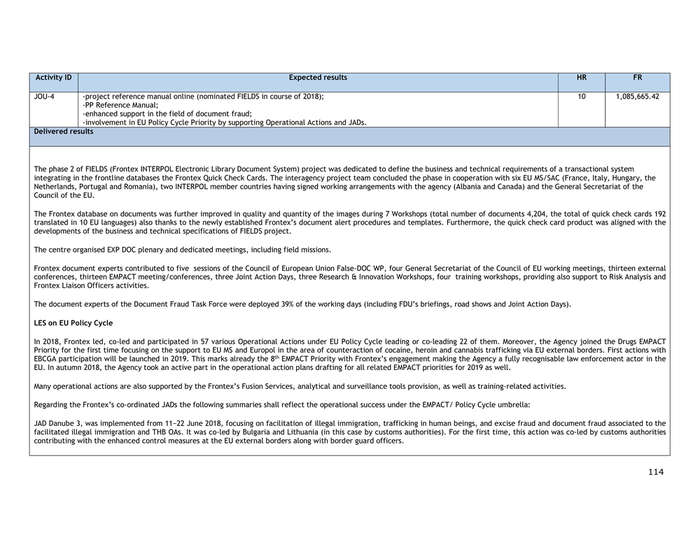
The aim of this JAD was to tackle facilitated irregular migration, as well as, to detect the cases of smuggling of excise goods and document fraud use. A joint Frontex-Europol risk analysis was prepared prior to the action and Frontex deployed JAD tailored European Border Guard Team Members at selected border crossing points at the EU’s external land borders, along with customs authorities from several Member States and third countries, Europol and INTERPOL experts. The Coordination Centre that was set by Frontex in Bulgaria summarised 23 migrant smugglers arrested; 63 fraudulent documents detected; 510kg of drugs, 330,000 cigarettes and 12 tons of tobacco seized; 31 stolen vehicles recovered. Frontex officers also supported the detection of more than 2,160 irregular migrants and 580 persons staying in the EU illegally. JAD Mobile was held between 24 September and 7 October 2018. The action was focused upon stolen vehicles, illegal immigration and document fraud. The JAD was co-led by Europol, Germany, Greece and Poland. The Coordination Centre was established at Frontex HQ for the first time and was attended by 16 MS, 4 third countries, INTERPOL, CELBET and Europol. Europol supported the action in the field as well with its unique tools and helped to enhance the SIENA related data exchange between the actors involved. This JAD delivered significant operational results and detected: 500 stolen vehicles; 26 motorcycles; 324 stolen vehicle parts; 202 identity document fraud cases; 33 vehicle related document fraud cases; 7 handguns; 712 kg heroin in one seizure in Bulgaria (largest ever seizure of heroin at Kapitan Andreevo) and 547 kg of marijuana/hashish/skunk/cannabis. JAD Olympus has been implemented between 8 and 21 October 2018. The JAD was co-led with France and was focusing on document fraud and Illegal immigration with particular reference to the forgery and misuse of EU national identity documents. JAD Olympus has been implemented based on the platform of Frontex’s coordinated air Joint Operation (JO) Pegasus 2018, with the additional deployment of document fraud experts at selected airports. Ten airports were selected based on a tailored risk analysis. Key operational outcome: 19 arrests (one facilitator of illegal immigration identified; one trafficker identified); 84 forged / counterfeit documents (visa, passport, ID); 61 incidents of document fraud detected and 29 refusal entries; 55 genuine documents held by impostors detected. 50,000 passengers were checked against the INTERPOL Nominal database which resulted in three hits and one arrest. 115
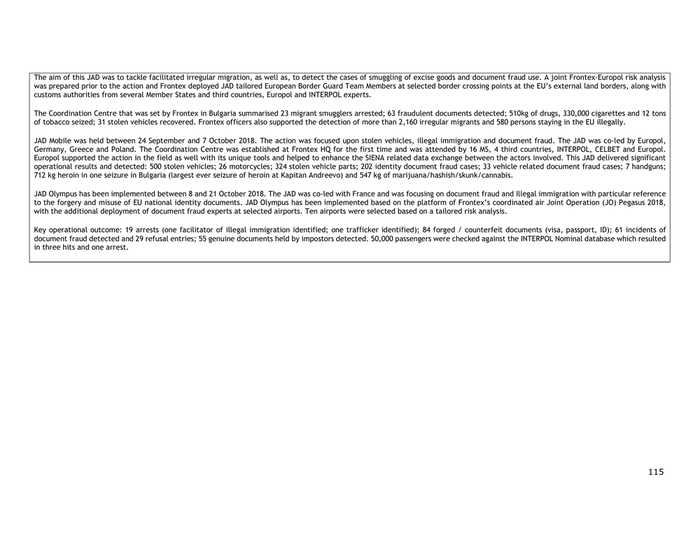
Activity ID Expected results HR FR JOU-5 -best practices on Land border’s ICC procedures; 7.5 464,418.50 -focal/ coordination points staff exchange; -the boarding working group; -Operational Heads of Airports Conference -facilitation activities at operational level with air carriers and airports (conferences, workshops, seminars, operational activities) Delivered results Best practices on land border’s ICC procedures − the electronic version of the handbook was distributed to all land border ICCs and fully implemented thus harmonizing the Land Borders’ ICC working procedures. Best Practices on Focal Points Local Coordinators − the draft handbook was revised based on the input from the local coordinators. Focal/coordination points staff exchange programme was maintained with the aim to enhance the cooperation and exchange of information as well as best practices among the Focal as well as coordination points. In total 11 Home MSs with 27 Teams and 8 TCs with 12 Teams participated in the exchange while 9 Host MSs and 1 TC hosted the visit of Staff Exchange Teams. Operational Heads of Airports Conference The Operational Heads of Airports Conference is organised by Frontex every year for operational commanders responsible for border control at international airports in order to further promote the value of cooperation in the field of Integrated Border Management. The aim of the Conference is to facilitate personal contacts between the operational leaders of international airports. Furthermore, it is a good opportunity for delegates to discuss issues of shared interest and be updated on the latest developments in the field of air border integrated management. The conference was attended by 139 officials Commanders of Border Guard Services at airports and Organisations’ Representatives. The conference went smoothly with declared satisfaction of several delegations. No relevant issues were identified and the participants were very satisfied with the event. Frontex’s staff presented the activities planned for 2018, answering to the questions and clarifications requested by the participants. In addition, the new Frontex’s organigram was presented and the responsibilities of newly created units and sectors. Risk Analysis Unit and other speakers reported on the challenges faced nowadays by airport border guards. Comprehensive information on Schengen Evaluation and Monitoring Mechanism, Frontex Vulnerability Assessment, EU Policy Cycle/EMPACT activities, Fundamental Rights and children was provided with specific emphases on travel documents. In addition, there was underlined the importance of the cooperation with TCs within air border domain. In March, CGS organised a meeting aimed at reviewing and updating the Handbook for Boarding in Frontex-Coordinated Joint Maritime Operations: Best Practices and Guidelines. In March, CGS participated, in Lübeck (Germany) in the Workshop on Mobile Training Concept Boarding organised by DEU Chairmanship of ECGF Forum. Divisional support costs related to JOU 1,2,3,4,5 – EUR 7,545,824.08 116
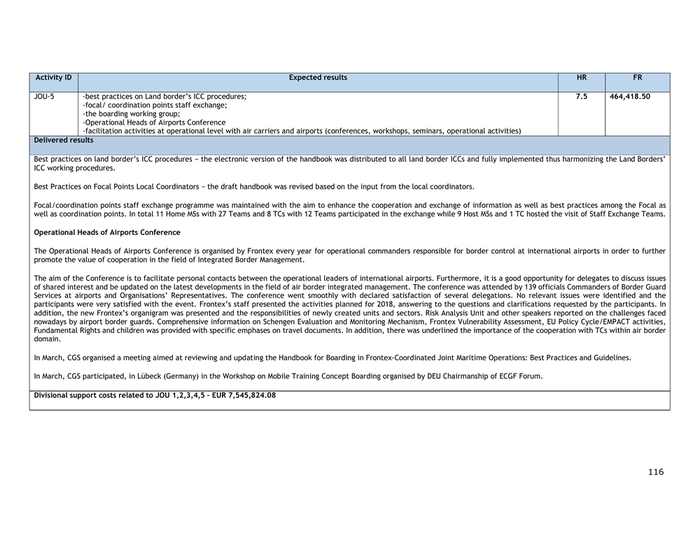
4.4. Return Activities ECRet-1 Return Support − Operational Concept Frontex will enhance the practical cooperation on return by increasing the numbers of return operations (national and joint) to destinations based on request from MS for assistance and coordination. The Rolling Operational Plan via the web based platform FAR will allow for day-to-day updates of MS requests for assistance and coordination. In parallel, Frontex will increase pre-return assistance to MS and facilitate operational cooperation with third countries, in particular identification of third-country nationals, acquisition of travel documents and networking. Missions to/from third countries may be organised to hold operational, technical talks/negotiations with local authorities on behalf of / together with MS. The activities will also cover the organisation and implementation of third country identification missions for identification, verification purpose and facilitation of the acquisition of travel documents. Frontex will support capacity building on return, incl. development of a return case management system model and training, with appropriate levels of targeted specialised courses, workshops and seminars. Frontex will ensure the technical and operational coordination of return-related activities of MS to achieve an integrated system of return management among competent authorities of MS, with the participation of relevant authorities of third countries and other relevant stakeholders. Frontex will aim at building synergies and connecting with Union-funded networks and programmes in close cooperation with COM and other relevant stakeholders. Frontex will be actively engaged in further development of the structure and content of IRMA and the use of this application. The role of Frontex Direct Contact Points on return and Pre-Return Activities Network will be further enhanced as part of the operational coordination of return management and for the exchanging of operational experience and knowledge in return matters. Frontex will continue in the process of phase-in/phase-out of the Eurint and EURLO programs. Other activities from the Eurint’s portfolio will be fully taken over. Feasibility of the take-over of the EURLO’s network will be further explored, incl. through the implementation of a pilot project. Frontex will provide technical and operational return assistance to MS subject to particular pressure on their return systems. Upon requests of MS, Frontex will deploy individual experts from the return pools or constitute European return intervention teams. Support MS in the organisation and implementation of returns by scheduled flights via possible framework agreement with carriers for the purchase of seats at special condition according to targeted technical requirements based on MS needs. 117
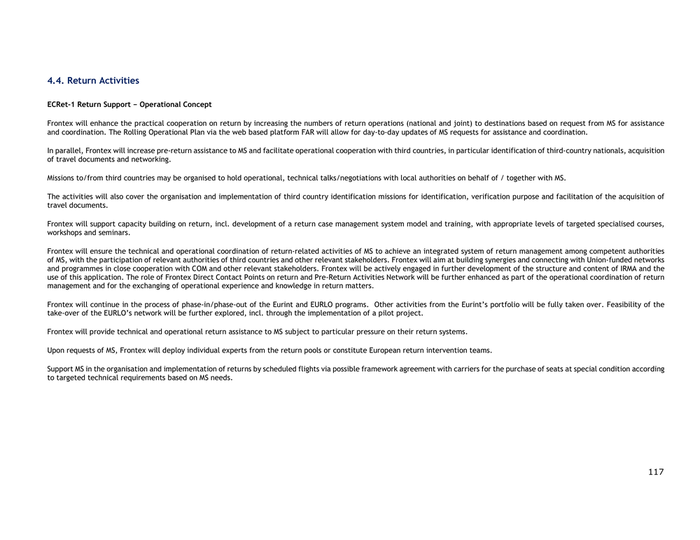
Activity ID Expected results HR FR ECRet-1 - 300 forced return operations; 43 49,403,080 - return operations on voluntary departure; - readmission operations in accordance with the EU/Turkey agreement; - enhanced support in the identification process and in obtaining of travel documents; - improved response to MS’ return needs. Delivered results Return operations Returns by scheduled flights – Frontex Pilot Project Since the launch of the pilot project 1,476 third-country nationals have been returned to 49 destinations by 17 Member States; The number of participating Member States is constantly increasing with their preference to use the mechanism in line with the national systems; There are currently no geographical limitations regarding returns by scheduled flights coordinated and co-financed by Frontex. Operations are booked and coordinated according to Member States’ needs using all available routes. The smooth running of the project is largely due to special agreements Frontex has achieved with different airlines. By the end of 2018, already 16 air carriers cooperated with ECRet with especially dedicated fares and operational conditions, which makes the use of Frontex’s Returns by scheduled flights the most efficient way to carry out this kind of operations. Return operations by charter flights organised or coordinated by Frontex 345 return operations were organised or coordinated with the support of Frontex. 12,245 third-country nationals were returned on charter flights in return operations organised or coordinated by Frontex. Almost half of returnees (6,099) were returned on joint return operations, while 3,717 persons on national return operations and 2,438 on collecting return operations. Four new destinations have been reached: Burkina Faso, Belarus, Senegal and Guinea-Bissau. In total, 38 destinations were reached, compared to 32 countries reached in 2017. Increasing interest by Member States in in the Collecting Return Operations. The number of these operations has increased by almost 76% in 2018 as compared to 2017. Readmission operations from Greece to Turkey under the EU–Turkey Statement Frontex continued to support the implementation of the EU-Turkey Statement by coordinating the deployments of human resources and providing technical assistance by chartering ferries, aircrafts and buses. 322 third country nationals were readmitted: 213 non-EU nationals on ferry boats and 109 Syrian nationals on planes. Deployment of monitors and escorts from the Frontex return pools Upon Member State request, Frontex can deploy forced-return monitors and forced-return escorts made available by other Member States as members of dedicated pools, to support return operations. 118
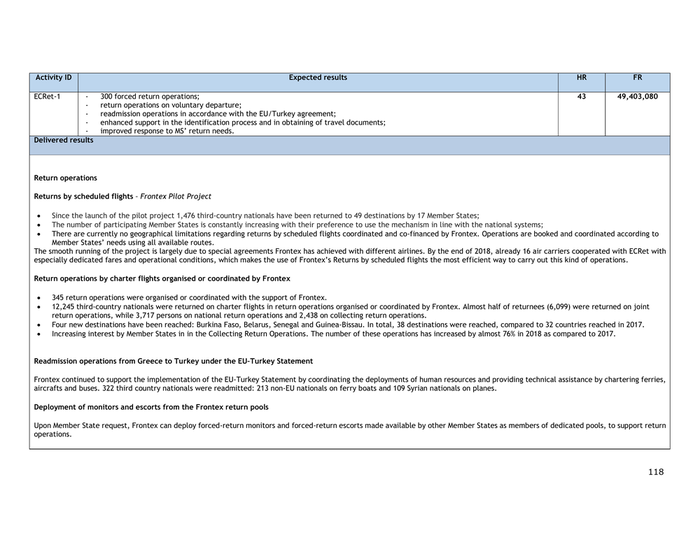
In 2018, the Frontex pool of forced-return monitors reached 66 monitors contributed by 21 Member States; 231 out of 345 return operations by charter flights in 2018 were carried out with a monitor on board: 159 of these operations were monitored by monitors from the Frontex pool; The pool of forced-return escorts consist of 446 people from 24 Member States. Framework Contract (FWC) for chartering aircrafts Upon Member States’ request or on its own initiative, Frontex provides aircrafts for national or joint return operations by charter flights as well as readmission operations by air, either by chartering them within a dedicated Frontex framework contract or by requesting other available Member States to charter an aircraft. In 2018, the Agency chartered 13 aircrafts: 6 for return operations, 2 for connecting flights and 5 for readmission operations. Frontex Application for Returns (FAR), is a dedicated web-based application for sharing operational information among Member States and Frontex for planning and implementing return operations by both charter and scheduled flights. A FAR module on scheduled flights has been developed and implemented, becoming an integrated part of FAR accessible for all Member States’ use; the new FAR module on scheduled flights can be used to request flight tickets at special operational conditions reserved to Frontex; three new versions of the FAR module on charter flights were released in order to incorporate new features and functionalities; the FAR finance module was also released during 2018 and is now in regular use; a mobile version of FAR is currently being developed to be ready by 2019. Common standards: Code of Conduct for Return Operations and Return Interventions In April 2018, the revised Code of Conduct for Return Operations and Return Interventions coordinated or organised by Frontex was adopted. The purpose of the document is to raise and harmonise ethical standards during return operations in order to provide a coherent and comprehensive response to challenges in returning non-EU nationals. The Code is applicable and binding for all participants during all return operations coordinated or organised by Frontex. It was developed in cooperation with the Frontex Fundamental Rights Office and Consultative Forum. Identification process: in 2018, ECRet organised 12 identification missions in total involving 7 non-EU countries (NEU) and 7 MS. These identification missions resulted in 1519 interviewed non-EU nationals (NEUNs), 881 identified NEUNs and 402 ETDs issued. In cooperation with the EURLO project a pilot has been set up in 2018 to facilitate video conferencing equipment for identification purposes and to support the consular cooperation in the area of identification and documentation of AFG nationals under the EU-AFG arrangement ‘Joint Way Forward’. Recognising the reluctance of some non-EU countries to cooperate with the Agency on returns, ECRet organised 5 visits of non-EU countries (NEU) aiming to familiarise them and make them acquainted with the general mandate and tasks of the Agency on migration management with a focus on returns. Two of the visits where combined with a Consular Workshop, where Consuls of the relevant non-EU countries in the EU were invited in a meeting with their own central authorities and interested MS to discuss and address challenges on identification and return. A Frontex-GIN ‘Best Practices’ was concluded in July 2018. The ‘Best Practices’ are falling under the umbrella of the EU-GIN signed ‘Good practices on return and readmission’ and serves as technical and operational guidelines for the implementation of return related activities. Discussion with COD are ongoing. 119
